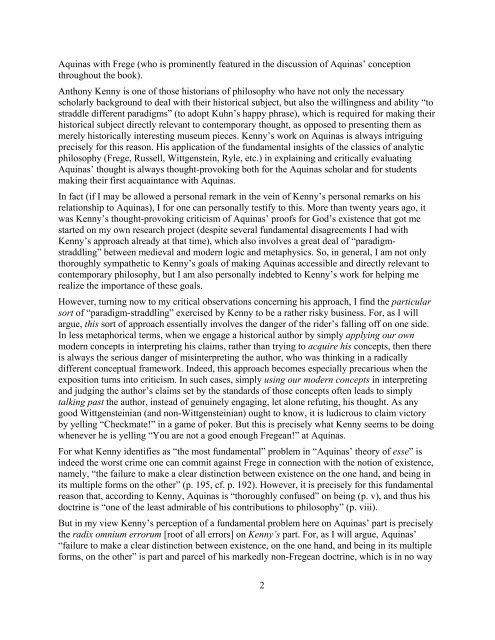On Kenny on Aquinas on Being - Fordham University Faculty
On Kenny on Aquinas on Being - Fordham University Faculty
On Kenny on Aquinas on Being - Fordham University Faculty
- No tags were found...
Create successful ePaper yourself
Turn your PDF publications into a flip-book with our unique Google optimized e-Paper software.
<strong>Aquinas</strong> with Frege (who is prominently featured in the discussi<strong>on</strong> of <strong>Aquinas</strong>’ c<strong>on</strong>cepti<strong>on</strong>throughout the book).Anth<strong>on</strong>y <str<strong>on</strong>g>Kenny</str<strong>on</strong>g> is <strong>on</strong>e of those historians of philosophy who have not <strong>on</strong>ly the necessaryscholarly background to deal with their historical subject, but also the willingness and ability “tostraddle different paradigms” (to adopt Kuhn’s happy phrase), which is required for making theirhistorical subject directly relevant to c<strong>on</strong>temporary thought, as opposed to presenting them asmerely historically interesting museum pieces. <str<strong>on</strong>g>Kenny</str<strong>on</strong>g>’s work <strong>on</strong> <strong>Aquinas</strong> is always intriguingprecisely for this reas<strong>on</strong>. His applicati<strong>on</strong> of the fundamental insights of the classics of analyticphilosophy (Frege, Russell, Wittgenstein, Ryle, etc.) in explaining and critically evaluating<strong>Aquinas</strong>’ thought is always thought-provoking both for the <strong>Aquinas</strong> scholar and for studentsmaking their first acquaintance with <strong>Aquinas</strong>.In fact (if I may be allowed a pers<strong>on</strong>al remark in the vein of <str<strong>on</strong>g>Kenny</str<strong>on</strong>g>’s pers<strong>on</strong>al remarks <strong>on</strong> hisrelati<strong>on</strong>ship to <strong>Aquinas</strong>), I for <strong>on</strong>e can pers<strong>on</strong>ally testify to this. More than twenty years ago, itwas <str<strong>on</strong>g>Kenny</str<strong>on</strong>g>’s thought-provoking criticism of <strong>Aquinas</strong>’ proofs for God’s existence that got mestarted <strong>on</strong> my own research project (despite several fundamental disagreements I had with<str<strong>on</strong>g>Kenny</str<strong>on</strong>g>’s approach already at that time), which also involves a great deal of “paradigmstraddling”between medieval and modern logic and metaphysics. So, in general, I am not <strong>on</strong>lythoroughly sympathetic to <str<strong>on</strong>g>Kenny</str<strong>on</strong>g>’s goals of making <strong>Aquinas</strong> accessible and directly relevant toc<strong>on</strong>temporary philosophy, but I am also pers<strong>on</strong>ally indebted to <str<strong>on</strong>g>Kenny</str<strong>on</strong>g>’s work for helping merealize the importance of these goals.However, turning now to my critical observati<strong>on</strong>s c<strong>on</strong>cerning his approach, I find the particularsort of “paradigm-straddling” exercised by <str<strong>on</strong>g>Kenny</str<strong>on</strong>g> to be a rather risky business. For, as I willargue, this sort of approach essentially involves the danger of the rider’s falling off <strong>on</strong> <strong>on</strong>e side.In less metaphorical terms, when we engage a historical author by simply applying our ownmodern c<strong>on</strong>cepts in interpreting his claims, rather than trying to acquire his c<strong>on</strong>cepts, then thereis always the serious danger of misinterpreting the author, who was thinking in a radicallydifferent c<strong>on</strong>ceptual framework. Indeed, this approach becomes especially precarious when theexpositi<strong>on</strong> turns into criticism. In such cases, simply using our modern c<strong>on</strong>cepts in interpretingand judging the author’s claims set by the standards of those c<strong>on</strong>cepts often leads to simplytalking past the author, instead of genuinely engaging, let al<strong>on</strong>e refuting, his thought. As anygood Wittgensteinian (and n<strong>on</strong>-Wittgensteinian) ought to know, it is ludicrous to claim victoryby yelling “Checkmate!” in a game of poker. But this is precisely what <str<strong>on</strong>g>Kenny</str<strong>on</strong>g> seems to be doingwhenever he is yelling “You are not a good enough Fregean!” at <strong>Aquinas</strong>.For what <str<strong>on</strong>g>Kenny</str<strong>on</strong>g> identifies as “the most fundamental” problem in “<strong>Aquinas</strong>’ theory of esse” isindeed the worst crime <strong>on</strong>e can commit against Frege in c<strong>on</strong>necti<strong>on</strong> with the noti<strong>on</strong> of existence,namely, “the failure to make a clear distincti<strong>on</strong> between existence <strong>on</strong> the <strong>on</strong>e hand, and being inits multiple forms <strong>on</strong> the other” (p. 195, cf. p. 192). However, it is precisely for this fundamentalreas<strong>on</strong> that, according to <str<strong>on</strong>g>Kenny</str<strong>on</strong>g>, <strong>Aquinas</strong> is “thoroughly c<strong>on</strong>fused” <strong>on</strong> being (p. v), and thus hisdoctrine is “<strong>on</strong>e of the least admirable of his c<strong>on</strong>tributi<strong>on</strong>s to philosophy” (p. viii).But in my view <str<strong>on</strong>g>Kenny</str<strong>on</strong>g>’s percepti<strong>on</strong> of a fundamental problem here <strong>on</strong> <strong>Aquinas</strong>’ part is preciselythe radix omnium errorum [root of all errors] <strong>on</strong> <str<strong>on</strong>g>Kenny</str<strong>on</strong>g>’s part. For, as I will argue, <strong>Aquinas</strong>’“failure to make a clear distincti<strong>on</strong> between existence, <strong>on</strong> the <strong>on</strong>e hand, and being in its multipleforms, <strong>on</strong> the other” is part and parcel of his markedly n<strong>on</strong>-Fregean doctrine, which is in no way2
















